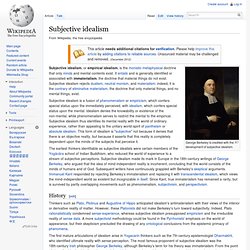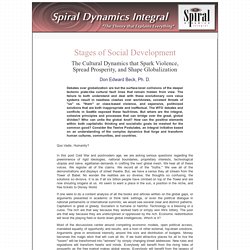

Everyday Philosophy from Prospect Magazine. Justice with Michael Sandel - Online Harvard Course Exploring Justice, Equality, Democracy, and Citizenship. Video Lectures 2010.
Immaterialism. George Berkeley is credited with the development of subjective idealism.

Subjective idealism is a fusion of phenomenalism or empiricism, which confers special status upon the immediately perceived, with idealism, which confers special status upon the mental. Idealism denies the knowability or existence of the non-mental, while phenomenalism serves to restrict the mental to the empirical. Subjective idealism thus identifies its mental reality with the world of ordinary experience, rather than appealing to the unitary world-spirit of pantheism or absolute idealism. Spiral Dynamics Integral - Dr Don Beck. Don Edward Beck, Ph.

D. Debates over globalization are but the surface-level collisions of the deeper tectonic plate-like cultural fault lines that remain hidden from view. The failure to both understand and deal with these evolutionary core value systems result in needless clashes over worldviews, constant threats of "us" vs. "them" or class-based violence, and expensive, politicized solutions that are both inappropriate and ineffectual. The WTO debates and conflicts in Seattle exposed these fault-lines. Philosophy. Philosophy. Continental Philosophy.